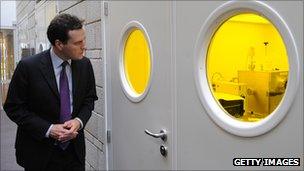Is George Osborne the first 'Science Chancellor'?
- Published

Chancellor George Osborne has made a string of research funding announcements
Is George Osborne turning out to be the "Science Chancellor"? On the face of it, it's looking that way.
First, he protected the science budget in the Autumn Statement last year when there were deep cuts in practically all other areas. Then, in the budget earlier this year, he found an extra 拢100m for capital expenditure. At the Conservative Party Conference, Mr Osborne found 拢50m for a graphene research centre and 拢150m for a computer hub.
And on Tuesday, he's coughed up an extra 拢200m when once again other areas of government are facing cutbacks.
But look beyond the headlines and there's another interpretation of what's been happening to the research budget.
According to the Campaign for Science and Engineering (Case), the string of good news announcements over the past year came after Mr Osborne's cash terms cut of 拢1.7bn, and that's even before inflation is taken into account.
This invisible and underlying cut effectively threatens the long-term viability of UK research, according to Case's director, Imran Khan.
"Science moves forward all the time - if we don't have the investment to keep up with it, then we could see a return to the dark days of the 1980s when labs up and down the country were run down. We're not in a crisis yet, but we really need to at least replace the 拢1.7bn that was cut last year if science and engineering are to help us reboot the economy."
So, why is Mr Khan complaining when all the leading scientific bodies are cheering?
The answer might lie in the circumstances of the run up to the previous Autumn Statement. Last year, the science community feared very deep cuts.
There was concern that George Osborne and David Cameron didn't know or care about UK research, and that the research budget was about to be slashed by up to 25%.
I understand that it was only an 11th-hour intervention by the Science Minister, David Willetts, along with the government's Chief Scientist, Professor Sir John Beddington, and the then Director General, Research Professor Sir Adrian Smith, that spared science the axe.
But even then the three men were unable to prevent a 41% cut in so-called capital expenditure - the money for maintenance and upkeep of the UK's labs and equipment.
The cut, of 拢1.6bn, didn't register in the headlines because the definition of the science budget was redefined: it excluded the capital budget.
The government was therefore able to claim that the budget had been frozen, or "protected", as Mr Willetts preferred to say. Had the reduction in the capital budget been included as part of the science budget, as it had been the previous year, it would have registered as a sizable real-terms cut.
Tickling the Treasury
So what appeared to be a "good outcome for science", as the Prime Minister described it, was not as good as it first seemed. So why the happy faces at the Royal Society and other revered scientific bodies?
Well. Mr Willetts and Profs Beddington and Smith urged, and have continued to urge, the scientific community to not rock the boat.
The night before last year's Autumn Statement they were glad-handing the scientific glitterati at a reception hosted by the Times Newspaper, telling some of the most influential people in the research community and media that this was the best deal that could be achieved under the circumstances.
To anyone quibbling, they'd point out that the settlement was much better than the deep cuts that had been planned.
Stage Two of the plan involved tickling the Treasury. The three men and their allies within Whitehall have tried to win parcels of money from Mr Osborne to help redress the capital shortfall and to support a few high-profile research projects.
In return, the Chancellor has had some positive headlines and photo opportunities.
The UK boasts some of the best research facilities in the world, such as the Diamond synchrotron (a type of particle accelerator). But can we stay ahead?
So, for a relatively small amount of money, the government is able to point to some rays of sunshine and long-term investment when there's little else to cheer about.
In return the research community is duly grateful. So doesn't' everyone win under this arrangement? Isn't it good for science and good for the government?
Not so, according to Mr Khan, at least not in the long term. The all important lack of capital spending means that, with each passing year, equipment is not being replaced, facilities are not being maintained and new state-of-the-art labs beyond those already agreed are not being built.
According to Mr Khan, this means that research isn't being carried out and the research community is having to eat into its seed corn.
"The investments that the government has announced over the past year, including today's, are really important," he told me.
"They'll give the UK a competitive edge in some important and exciting fields. But the capital funding available for the rest of the UK's research base is being neglected.
"The government did protect day-to-day spending at a difficult time, but they slashed capital funding by almost a half - that's money required for making sure we have up-to-date equipment and technology in our labs."
- Published29 November 2011
- Published3 October 2011
- Published20 December 2010
- Published21 October 2010
- Published20 October 2010